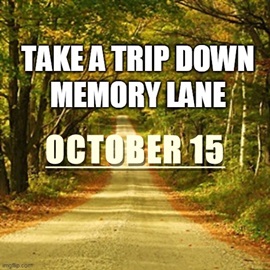10/15 Entertainment History
“The soul of man has been given wings and at last he is beginning to fly. He is flying into the rainbow! Into the light of hope, into the future! The glorious future that belongs to you, to me and to all of us.”
~The Jewish Barber disguised as Adenoid Hynkel
‘The Great Dictator’
ROCK & ROLL HISTORY
1957 – RCA Records released Elvis’s Christmas Album. The record contained eight Christmas songs and four gospel songs.
While Blue Christmas became a big hit for Presley, his recording of Irving Berlin’s White Christmas was another matter.
After hearing Presley’s version of his song, which Berlin saw as a “profane parody of his cherished yuletide standard,” he ordered his staff to telephone radio stations, demanding the song be discontinued from radio play.
While most U.S. radio stations ignored Berlin’s request, Al Priddy, a DJ in Portland, OR was fired for playing the song on the air.
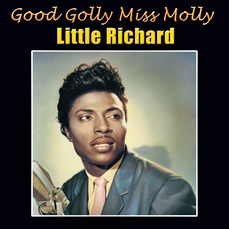
1958 – Little Richard recorded Good Golly Miss Molly at J&M Studio in New Orleans.
The song was not released as a single until January 1958 and when it was, it peaked at #4 on the Billboard Hot 100 and quickly became a rock ‘n’ roll standard.
1958 – Jackie Wilson recorded Lonely Teardrops.
The single raced up to #1 on the Billboard R&B chart and became Wilson’s first top ten hit on the Billboard Hot 100, eventually peaking at #7.
In 1975, Wilson was performing that song while appearing as one of the feature acts in Dick Clark’s Good Ol’ Rock and Roll Revue. In tragic irony, the line he was singing before collapsing with a massive heart attack was “My heart is crying.”
They were the last words he ever spoke. He slipped into a coma and died in January 1984.
1959 – Jim Reeves recorded He’ll Have To Go at RCA Studio B in Nashville.
It was originally released as the B-Side to In A Mansion Stands My Love but radio stations focused on He’ll Have To Go which went on to grab the #1 position on the Hot Country Singles chart while peaking at #2 on the Billboard Hot 100 chart.
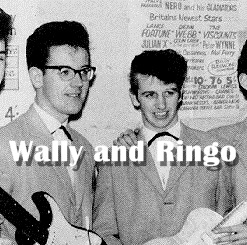
1960 – The Beatles’ first recording with Ringo Starr occurred at a much earlier date than most people realize.
Alan Williams, the manager of the Beatles and booking agent for Rory Storm & The Hurricanes, paid for a session at Akustik Studio, 57 Kirchenalle, The Klockmann-House in Hamburg.
The recording featured the vocal “talent” of Hurricanes’ bass guitarist Lu ‘Wally’ Walters. The Beatles (with the exception of Stuart Sutcliffe, who did not play) provided the backing but with drummer Pete Best in town buying drumsticks, Hurricanes’ drummer Starr joined in for the recording of George Gershwin’s Summertime.
Six copies were pressed onto 78 RPM acetate discs, though none are known to have survived.
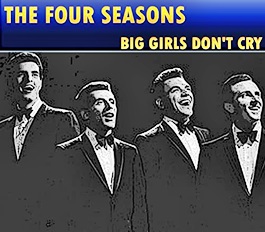
1962 – The Four Seasons released Big Girls Don’t Cry. When the single reached #1 on the Billboard Hot 100, the Four Seasons became the first rock-era act to hit the top spot with their first two chart entries (Sherry being the first).
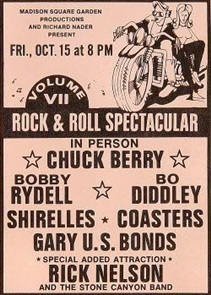
1971 – Rick Nelson took part in a Rock ‘N’ Roll Revival concert at Madison Square Garden in New York City.
Even though he looked different from his 1950s-1960s days (long hair), the crowd responded well when he played his old hits. But when he played the Rolling Stones’ Country Honk, a country version of their hit song Honky Tonk Women, the crowd began to boo … “when I sang a song about a honky-tonk, it was time to leave.”
Some reports say that the booing was caused by police action in the back of the audience but Nelson took it personally and left the stage. He watched the rest of the concert backstage and did not reappear on stage for the concert finale. The negative experience inspired him to record Garden Party.
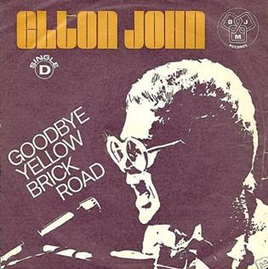
1973 – Elton John released the Goodbye Yellow Brick Road single.
It reached #1 in Canada, #2 in the U.S., and #6 in the UK

1977 – Paul Simon released Slip Slidin’ Away. The single, which featured the Oak Ridge Boys on backing vocals, peaked at #5 on the Billboard Hot 100.
1977 – Debby Boone’s You Light Up My Life hit #1 for the first of 10 weeks, the longest consecutive chart run in the history of the Billboard Hot 100 at the time.
MOVIE/TV HISTORY

1940 – The Great Dictator premiered in New York City.
The political satire comedy-drama film was written, directed, produced, and scored by comedian Charlie Chaplin, who also starred in two roles; ruthless dictator Adenoid Hynkel and a persecuted Jewish barber.
At the time of its first release, the United States was still formally at peace with Nazi Germany and neutral during what were the early days of World War II. In his 1964 autobiography, Chaplin stated that he could not have made the film if he had known about the true extent of the horrors of the Nazi concentration camps at that time.
This final scene is one of the most powerful ever filmed. As remarkable as it was in 1940, its message is just as relevant all these years later.

1951 – I Love Lucy premiered on CBS.
The sitcom was the first scripted television program to be shot on 35mm film in front of a studio audience. It became the most-watched show in the United States in four of its six seasons, and it was the first to end its run at the top of the Nielsen ratings.
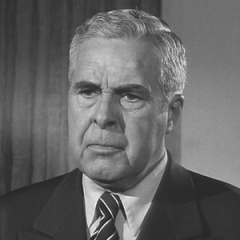
1958 – Actor John Hamilton, best remembered for his role as editor Perry White on Adventures of Superman, died of a heart attack at the age of 71.
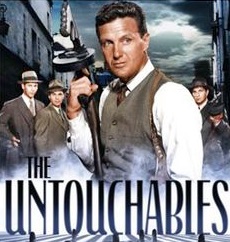
1959 – The Untouchables premiered on ABC.
Based on the memoir of the same name by Eliot Ness and Oscar Fraley, it fictionalized the experiences Ness had as a Prohibition agent, fighting crime in Chicago in the 1930s with the help of a special team of agents handpicked for their courage and moral character.
The series starred Robert Stack as Ness and aired for four seasons.
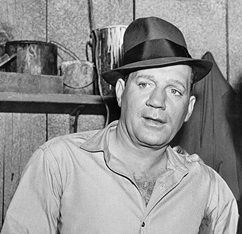
1983 – Actor Pat O’Brien died from a heart attack at the age of 83.
One of the best-known screen actors of the 1930s and 1940s, he appeared in over 100 films and is well-remembered for his roles in Knute Rockne, All American, Angels with Dirty Faces, and Some Like It Hot.
SPORTS HISTORY
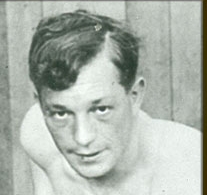
1910 – Stanley “The Michigan Assassin” Ketchel, one of the greatest middleweight boxing champions in history, was shot and killed while being robbed. He was only 24.
Ketchel had a record of 51 wins, four losses, and 48 of those wins came by knockout. His battle with heavyweight champion Jack Johnson in 1909 has been called by many a modern day “David and Goliath”.
Outweighed by 49 pounds, Ketchel – who feared no man – took Johnson to the 12th round before losing by knockout.
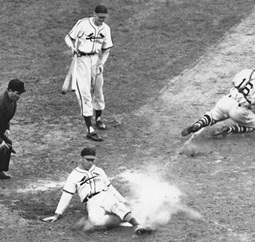
1946 – With the World Series between the St. Louis Cardinals and Boston Red Sox deadlocked at three games apiece, Enos “Country” Slaughter made a “Mad Dash” and ran himself into baseball immortality.
Slaughter started the bottom of the 8th inning of a 3-3 tie with a single. Two outs later, Harry Walker lined a ball to left-center field and as the ball was relayed to Boston shortstop Johnny Pesky, Slaughter rounded third base and continued for home.
Some claim that Pesky, assuming that Slaughter would not be running home, checked Walker at first base instead of immediately firing home, while others contend that Pesky was so shocked to see Slaughter on his way to score that he had a mental lapse that accounted for the delay.
In Boston, “Pesky held the ball” became a catchphrase, although a soft throw from Leon Culberson (playing centerfield in place of the strong-armed Dom DiMaggio who had been injured one inning earlier) may have been more to blame.
The run put the Cardinals ahead 4–3 and proved to be the winning run of the decisive seventh game.
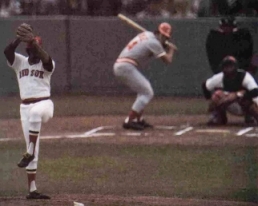
1975 – In today’s world of starting pitchers being pulled from games after throwing 100 pitches (or less), it may be difficult to believe but on this date, Luis Tiant of the Boston Red Sox threw 163 pitches to beat Cincinnati 5-4 in Game 4 of the World Series.

1986 – Down three games to one in the American League Championship Series and trailing 5-4 in the 9th inning, Boston’s Dave Henderson launched a 2-out, 2-strike 2-run home run to put the Red Sox ahead of the California Angels.
Boston won the game in extra innings and went on to win the series in 7 games.
1988 – With two outs in the bottom of the 9th inning, an injured Kirk Gibson hit a dramatic two-run home run to give the Los Angeles Dodgers a 5-4 win in the first game of the World Series.
Compiled by Ray Lemire ©2005-2020 RayLemire.com / Streamingoldies.com. All Rights Reserved.
